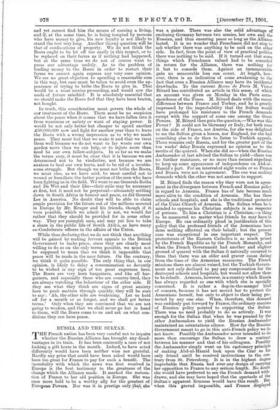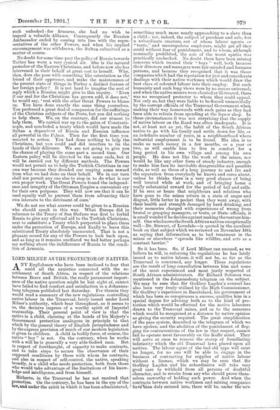RUSSIA AND THE SULTAN.
!THE French nation has been very careful not to inquire _I_ whether the Russian Alliance has brought any disad- vantages in its train. It has been eminently a case of not looking a gift horse in the mouth. Indeed, to have acted differently would have been neither wise nor grateful. Hardly any price that could have been asked would have been too great for France to pay for such a benefit. The incredulity with which the news was first received in Europe is the best testimony to the greatness of the change which the Alliance made. It marked the restora- tion of France to her old position in Europe. She was once more held to be a worthy ally for the greatest of Enropean Powers. Nor was it in prestige only 94,,t`i sihe was a, gainer. There was also the solid advantage of enclosing Germany between two armies, her own and. the Russian, and thus ensuring peace so long as the .Allia,nce lasted. It is no wonder that Frenchmen did not stop to ask whether there was anything to be said. on the other side. In fact; from the point of view of practical politics there was nothing to be said. If it turned out that some things Which Frenchmen valued had to be conceded in return for the Alliance, there was nothing for it but to concede them. Against an immeasurable gain no measurable loss can count. At length, how- ever, there is an indication of some awakening to the fact that even a Russian Alliance may have its incidental drawbacks. To the current Iterue de Paris M. Victor Berard has contributed an article in this sense, of which an account was given on Monday in the Paris corre- spondence of the Times. M. Berard deals with the recent difference between France and Turkey, and he is greatly impressed by the improbability that the Sultan would have prolonged his resistance to the French demands .except with the support of some one among the Great Powers. M. Berard then puts the question,—Who was this Power? It could not be Germany or Italy, for both were on the side of France, nor Austria, for she was delighted to see the Sultan given a lesson, nor England, for she had something else to do than to listen to Turkish appeals. There remains only Russia, and for the greater part of the ten weeks' delay Russia expressed no opinion as to the merits of the quarrel. When she did so—when the Russian Ambassador at last advised the Sultan to yield—there was no further resistance, or no more than seemed expedient to keep up some appearance of independence on Abd-ul- Hamid's part. For an interval of eight weeks or so France and Russia were not in agreement. The one was making demands which the other was not anxious to support.
M. Berard finds the reason why they were not in agree- ment in the divergence between French and Russian policy in regard to Armenia. France has of late become much more alive to the condition of Armenia. She has there schools and hospitals, and she is the traditional protector of the Uniat Church of Armenia. The Sultan when he is minded to oppress his Christian subjects is no respecter of persons. To him a Christian is a Christian,—a thing to be massacred no matter what friends he may have in Europe. He can ordinarily plead in justification of this policy that the professed friends of the Armenians have done nothing effectual on their behalf; but the present case was exceptional in one important respect. The protectorate of the Eastern Catholics is as much prized by the French Republic as by the French Monarchy, and when the French Government had another and slighter ground of quarrel with the Sultan it naturally occurred to them that there was an older and graver cause dating from the time of the Armenian massacres. The French missions there are almost ruined, but the Turkish Govern- ment not only declined to pay any compensation for the destroyed schools and hospitals, but would not allow them to be rebuilt. Armenia, however, is a country which Russia has always regarded as one with which she is specially concerned. It is rather a dog-in-the-manger kind of concern, because it has not moved her to protect the Armenians herself, but only to object to their being pro- tected by any one else. When, therefore, this demand was suddenly put forward by France, the ordinary maxims of Russian policy pointed to supporting the Sultan. There was no need probably to do so actively. It was enough for the Sultan that when he was pressed by the other Ambassadors to yield the Russian Ambassador maintained an ostentatious silence. How far the Russian Government meant to go in this anti-French policy we do not know. Possibly the Ambassador never intended to do more than encourage the Sultan to draw a contrast between his ma.nner and that of his colleagues. Possibly the Ambassador simply went on his mistomary principle of making Abd-ul-Hamid look upon the Czar as his only friend until he received instructions to the con- trary from St. Petersburg. It is. in the .highest degree improbable that Russia had ever any design of carrying her opposition to France to any serious length. No doubt she would have preferred to see the French demand with- drawn, and she may have hoped that the spectacle of the Sultan's apparent firmness would have this result. But when this proved impossible, and. France displayed such unlooked - for firmness, she had no wish to imperil a valuable Alliance. Consequently the Russian Ambassador ended by coming into line with the repre- sentatives of the other Powers, and when his implied encouragement was withdrawn, the Sultan submitted as a matter of course.
No doubt for some time past the policy of Russia towards Turkey has worn a very cynical air. She is the natural protector of the Eastern Christians, and before now she has intervened in their behalf at great cost to herself. Why, then, does she pose with something like ostentation as the friend of their oppressor, and make the maintenance of the present state of things in Turkey a distinct feature of her foreign policy? It is not hard to imagine the sort of reply which a Russian might give to this inquiry. 'Even if our zeal for the Christians has grown cold, it does not,' he would say, 'rest with the other Great Powers to blame us. You have done exactly the same thing yourselves. You professed a great deal of compassion for the sufferings of the Christian subjects of the Porte, but you did nothing to help them. We, on the contrary, did our utmost to help them. We carried war up to the gates of Constanti- nople, and concluded a treaty which would have made the Sultan a dependant of Russia and. Russian influence all powerful in the Palace. Then for the first time you resorted to action. You had done nothing to help the Christians, but you could and did interfere to tie the hands of their deliverer. We are not going to give you the chance of playing the same part a second time. Our Eastern policy will be directed to the same ends, but it will be carried out by differdnt methods. The Powers would not permit us to help the Turkish Christians in our own way because they dreaded our reaping some reward from what we had done on their behalf. We in our turn shall not permit any one else to step in to do what is our own proper work. The Great Powers found the independ- ence and integrity of the Ottoman Empire a convenient cry for their own purposes. They will now see that it can be used equally well to prevent them from advancing their own interests to the detriment of ours.'
We do not see what answer could be given to a Russian who should speak in this way. What Europe did in reference to the Treaty of San Stefano was first to forbid Russia to give any effectual aid to the Turkish Christians, next to substitute a Treaty which purported to place them under the protection of Europe, and finally to leave this substituted Treaty absolutely unexecuted. That is not a pleasant record for any of the Powers to look back upon, and as long as it remains uneffaced we had better perhaps say nothing about the indifference of Russia to the condi- tion of Armenia.











































 Previous page
Previous page